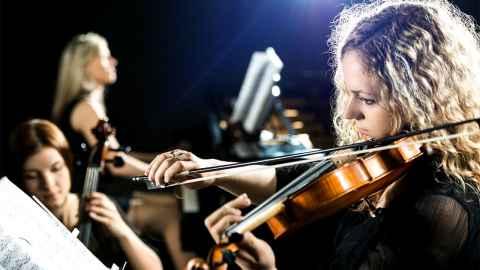RNZ Concert more than ratings and revenue
10 February 2020
Opinion: The proposed demise of RNZ Concert as we know it is a disaster for the arts in New Zealand, writes James Tibbles, Head of the Music School.

To suggest offering a fully automated music station as a replacement for a vibrant, highly engaged programme schedule relevant to New Zealand is extraordinary in the extreme.
Ironically, when we look at the vast number of classical stations accessible on internet platforms, we see that public radio – even when appearing to be of interest only to a somewhat ‘niche’ market – is actually alive and well.
But how do we define ‘alive and well’? If we look at ratings, at revenue, at costs, at the bottom line, then what is proposed could be seen as a logical solution to the perceived ‘problem’ of too small an audience, too expensive a service.
But let’s look closely at the so-called solution. For me, it raises two substantive issues: one is about how young people engage in music; the other, much broader, is about how important it is to support the arts in New Zealand.
Starting with the first point, the fact is young people ‘do’ classical music. Many thousands learn classical instruments such as piano, violin and flute, throughout the country. They play in school orchestras and bands, and sing in choirs, all over New Zealand. A good number continue to study music at university level – often taking conjoint degrees that give them a broad education and a wide range of career options. Many of these students become our next generation of performers, but even more are our audiences, our listeners, our community.
These young people also enjoy more contemporary musical styles. But why would RNZ (or anybody else) suggest that classical music should be marginalised, to the point of extinction on the airwaves, as the only solution to attract a younger audience to the network?
I would question the proposal to establish a new non-commercial radio station that targets younger audiences, given that there is an enormous range of options already available for young (and not so young) people wanting to listen to popular music on the many commercial stations.
The function of RNZ Concert runs much deeper than ratings and revenue. It has a critical role and responsibility in disseminating live music ‘made in New Zealand’ to the wider public, at home and internationally.
This includes broadcasting performances by New Zealand musicians, including those from organisations that receive public funding as well as the many that do not, and of showcasing compositions by New Zealanders - essential to the preservation and development of our unique cultural identity.
RNZ’s obligations also include nurturing and growing young musicians, through the broadcasting of chamber music competitions, choral competitions and festivals, solo, instrumental and vocal performances.
Seeking to attract more Māori and Pacific listeners and including more content from both those sections of the population is absolutely appropriate, and more thought clearly needs to be given on how best to achieve this.
This leads in the second issue about the importance of supporting the arts. We know the arts will always need support; it is an expensive commodity. However, looking back through history, a flourishing arts scene is always associated with a flourishing community, one in which cultural and aesthetic values are cherished, supported and nourished. In turn, these art forms nourish the community. This is not to say that ‘classical’ music, or other so-called traditional art forms, has exclusive rights to such support, but it is most certainly the case that it cannot be sacrificed.
New Zealand is a very young country - one that is struggling to work out who it is. What does it mean to be a New Zealander today? This is a question that must remain in the forefront of our thinking if we are to avoid becoming just a part of a blended, international community that is, in fact, not a community at all.
Where will the voice of New Zealand music be heard? Will it henceforth need to rely on potential audiences scrambling to find podcasts or live streams from entities that have the resources to livestream their performances? Where will the public find opportunities to engage in thinking about music and the arts, should the programmes, documentaries and featured stories vanish?
Radio is a very powerful medium; as such, the holders of the power of decision-making have a responsibility far beyond that of responding to market forces. The erosion of a collective New Zealand musical identity, should these changes proceed as proposed, will be devastating – not just to the musicians who are passionate about sharing with a wide community, but to the country at large.
We need to be allowed space on radio to think, to ask, to be challenged, to laugh and to cry - through interviews, discussions, live music and all else that fine ‘classical’ radio offers.
Instead, let’s grow the audience so it reflects our cultural landscape; let’s explore new ways to engage with the thousands upon thousands of people of all ages who ‘do’ classical music, but perhaps aren’t currently actively engaged with RNZ Concert. But let’s not turn it into an automatic machine for the brain-dead. We do not deserve this.
Associate Professor James Tibbles is Head of the School of Music at the University of Auckland.
This article reflects the opinion of the author and not necessarily the views of the University of Auckland.
Used with permission from Newsroom RNZ Concert more than ratings and revenue 10 February 2020.
Media queries
Alison Sims | Research Communications Editor
DDI 09 923 4953
Mob 021 249 0089
Email alison.sims@auckland.ac.nz